 Connect with us
Connect with us

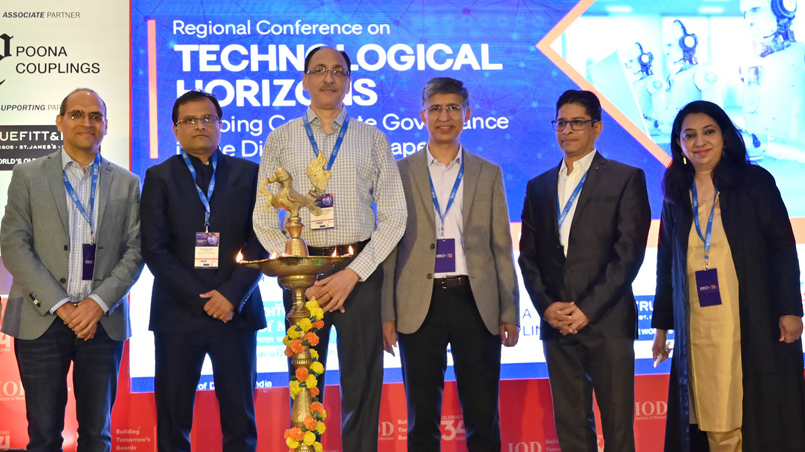 Jul 05, 2024
Jul 05, 2024
The Institute of Directors (IOD), Western Region, organised a Regional Conference on the theme, 'Technological Horizons: Shaping Corporate Governance in the Digital Landscape' on May 24, 2024, in Hotel Grand Sheraton, Pune. The conference witnessed participation from around 170 delegates, comprising government officials, business leaders, board members, directors, industry and board experts, policymakers, and academia. The event witnessed representation from both public and private institutions, and leading & emerging organisations in the technology space.
Plenary Session I – Innovation and Digital Transformation: Evolution of Corporate Governance
The program started with the 'Lighting of Lamp Ceremony'.
The 'Welcome Address' was delivered by:
Mr. Sitaram Kunte, IAS (Retd.)
Chairman, Institute of Directors – Western Region
former Chief Secretary, Government of Maharashtra
Mr. Kunte welcomed all the distinguished guests and participants. He explained the conference theme and emphasized the importance of digitalization in today's corporate world. He mentioned challenges arising from digitalization, particularly cyber-attack threats that can compromise organisational systems' integrity. He stated that auditing is the optimal solution to neutralize these threats, ensuring IT system integrity, analyzing potential breaches, and eliminating suspicious activities. He stressed the necessity of harnessing today's technology for societal improvement while protecting against malicious activities. He concluded by giving a brief introduction to the Institute of Directors (IOD) and enlightening the guests about its objectives and various services, such as the famed Golden Peacock Awards, corporate publications, a dedicated database of independent directors, board evaluations, and advocacy
This was followed by the 'Chief Guest Address' delivered by:
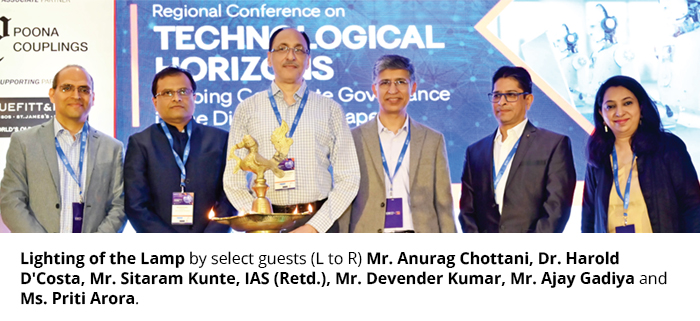
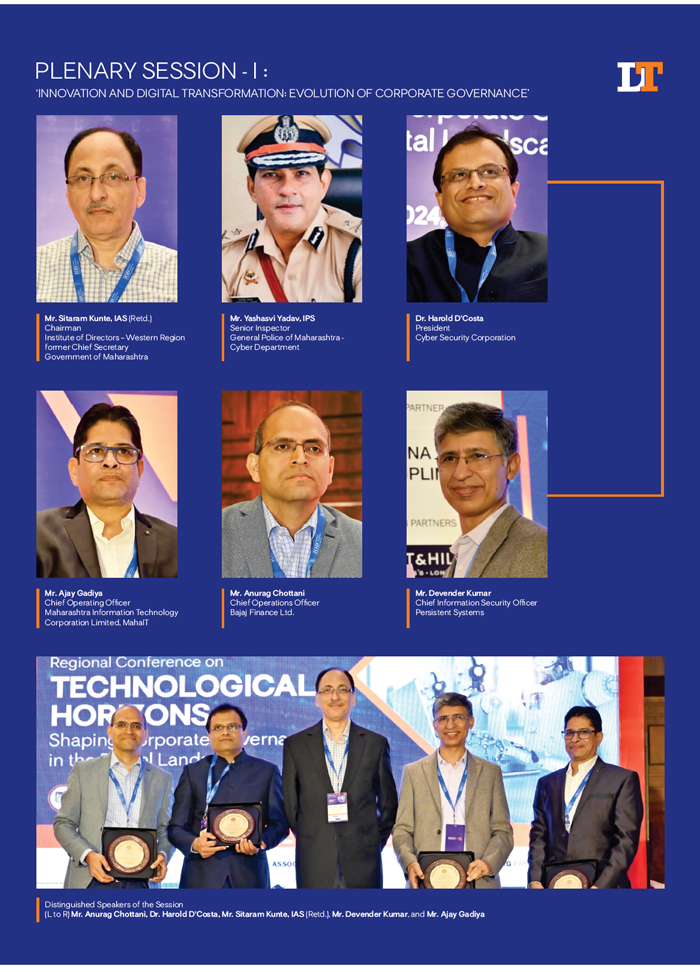
Mr. Yashasvi Yadav, IPS
Senior Inspector
General Police of Maharashtra - Cyber Department
Mr. Yadav addressed the audience virtually. He highlighted cybersecurity as today's paramount challenge, impacting national security and critical sectors such as finance and infrastructure. He cited examples such as the Cosmos Bank cyber heist and the JNPT ransomware attack to illustrate the severe impacts of cybercrime. Advocating proactive measures, he proposed mandatory bi-annual cybersecurity audits for organisations, similar to financial audits, to identify and rectify vulnerabilities in IT systems. He emphasized the importance of budget allocation for cybersecurity enhancements and integrating cybersecurity education into school curricula. Mr. Yadav concluded by cautioning that cybercrime could surpass physical crime within two years, emphasizing the urgency for robust cybersecurity measures
This was followed by the 'Guest of Honour Address' delivered by:
Dr. Harold D'Costa
President - Cyber Security Corporation
Dr. D'Costa outlined the Indian government's efforts in developing a cybersecurity framework and mentioned key legal acts and policies. He highlighted the Information Technology Act, 2000, emphasizing India's global rank as the 13th country to enact such legislation. He discussed the establishment of CERT-In as India's central cybersecurity agency, the National Cyber Security Policy, RBI's 2016 cybersecurity framework, and newer acts like the DPDP Act, 2023, and DISHA for medical record privacy. He also outlined key provisions of India's Cyber Security Regulations, focusing on data localization and enhanced data protection laws. He stressed the importance of robust cybersecurity practices in corporate governance, advocating for increased board accountability, standardized processes, transparency, collaborative efforts, and alignment with business objectives. Furthermore, he underscored the necessity of cyber compliance and cautioned against the indiscriminate use of social media platforms by corporations. He illustrated risks such as the modification of end-to-end encrypted messages, promoting a 'Swachh Cyber Abhiyan' akin to 'Swachh Bharat Abhiyan'.
The Distinguished Speakers of the Session were:
1. Mr. Ajay Gadiya
Chief Operating Officer
Maharashtra Information Technology Corporation Limited (MahaIT)
2. Mr. Anurag Chottani
Chief Operations Officer - Bajaj Finance Ltd.
3. Mr. Devender Kumar
Chief Information Security Officer - Persistent Systems
Mr. Gadiya provided a brief overview of Digital Transformation in the corporate sector. He clarified misconceptions by distinguishing between Digital Transformation, Digitalization, and Digitization. He discussed the reasons why digital transformation is crucial for companies across all sectors. He cited examples of renowned companies like Nokia and Kotak, illustrating how their failure to adapt led to their decline. He also highlighted the benefits of Digital Transformation, emphasizing the effective utilization of communication technology and other emerging technologies. In conclusion, he mentioned MahaIT's digital transformation infrastructure and its governance, which includes regular reviews and audits of firewall logs, proxy logs, etc.
Mr. Chottani provided information about Artificial Intelligence (AI), General AI, and Machine Learning. He offered insights into these emerging technologies and their potential to streamline repetitive tasks. He discussed the evolution of Cyber Crimes and outlined measures organisations can take to safeguard their data and valuable resources. He emphasized Cyber Security governance, which includes setting cultural norms, independent assessment of the CCMP (Cyber Crisis Management Plan), managing third-party and supply chain risks, establishing robust cyber defenses, and ensuring Data Privacy and Governance. He noted that penalties are typically imposed after incidents occur rather than as precautionary measures, prompting SEBI and regulatory authorities to introduce new and stringent regulations regularly.
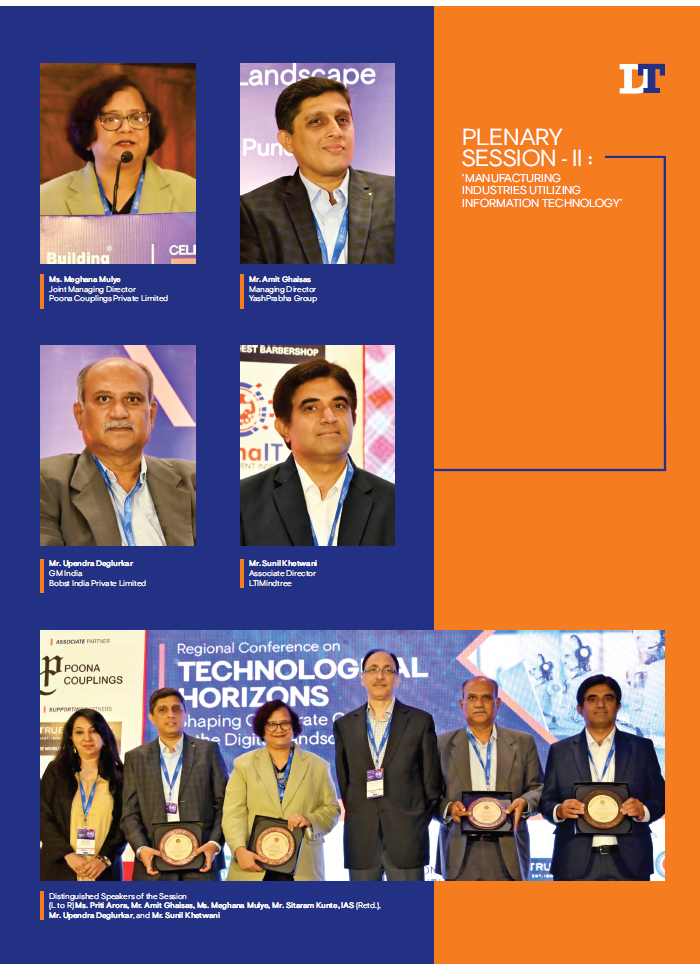
Mr. Kumar provided a brief overview of Cyber Security in the Digital Age, focusing on Data Privacy and Data Protection. He emphasized that organisations need to be vigilant due to the profitability of cyber-attacks, particularly with the success of ransomware. Utilizing the Deep and Dark Web, cybercriminals create and sell illicit products, often using cryptocurrencies like Bitcoin to obfuscate transactions. Mr. Kumar highlighted key indicators of cyber breaches, such as external attacks on servers, compromised IT security, lateral movement within networks, and data loss. He underscored the role of boards in establishing effective Cyber Security systems, including investments in robust technology, alignment of cyber risks with corporate objectives, proactive investment to avoid costly reactive measures, and integration of cyber security experts into board or risk and audit committees. He concluded by advocating for Cyber Insurance coverage for every organisation.
This was followed by an interactive Q&A Session with the Audience.
Plenary Session II - Manufacturing Industries Utilizing Information Technology
The Session was chaired by:
Ms. Meghana Mulye
Joint Managing Director
Poona Couplings Private Limited
The Distinguished Speakers of the Session were:
1. Mr. Amit Ghaisas
Managing Director - YashPrabha Group
2. Mr. Upendra Deglurkar
GM India - Bobst India Private Limited
3. Mr. Sunil Khetwani
Associate Director - LTIMindtree
Ms. Mulye introduced the topic of "Manufacturing Industries Utilizing Information Technology." She emphasized key areas such as the value proposition of Information Technology, data utilization and analysis, and the integration of technology with business transformation. She highlighted topics including industry integration, smart factory implementation, and sustainable manufacturing practices. She stated, "Information Technology is not here to eliminate jobs but to reskill us. Routine tasks are automated, allowing humans to focus on creative and new roles." She concluded by affirming, "AI will not replace jobs, but individuals proficient in operating AI will undoubtedly replace jobs."
Mr. Ghaisas addressed challenges in adopting IoT or any technology, emphasizing the importance of selecting the relevant technology and ensuring the right people are available to implement it. He stressed that the cost of technology should not be a deterrent if it is necessary for organisational implementation. When asked about whether MSME industries can adopt AI or IoT despite cost constraints, Mr. Ghaisas remarked that as long as the technology enhances cash flow for the organisation, cost should not be a concern. He also highlighted the importance of considering maintenance costs when choosing appropriate technology.
Mr. Deglurkar discussed how Artificial Intelligence helps in the Supply Chain, emphasized that while everything revolves around money, it should not increase the cost or compromise the efficiency and effectiveness of products. He highlighted the importance of improving productivity and managing operations more efficiently through technology, using the best available resources rather than always opting for the latest technology. He stressed the need for industries to have the capability and foresight to choose technologies that are appropriate and useful. He emphasized the importance of continued investment in IoT and AI to adapt to rapid changes in the industry environment, ensuring effective and efficient operations. He underscored the importance of achieving workflow efficiency, integrating robotics into machine operations, and ensuring that machines are operated by trained personnel. He concluded by stating, "Freedom is the highest level of responsibility."
Mr. Khetwani discussed how Internet of Things (IoT) and Automation can be leveraged in the manufacturing process. He shared live photos of a manufacturing unit, one depicting a manual process and another showing a fully automated process. He highlighted the differences between the two approaches and discussed the advantages of fully automated processes, such as reduced emissions, continuous temperature monitoring, malfunction detection, and the effective capture and neutralization of gases emitted during production. He concluded by emphasizing, "Culture matters in any organisation."

This was followed by an interactive Q&A Session with the Audience.
Plenary Session III – Advancing Corporate Governance: Principles and Practices
The Session was chaired by:
Mr. Chandrashekhar Chincholkar
Director – Corporate Advisory
CES India Pvt. Ltd.
The Distinguished Speakers of the Session were:
1. Mr. Jambunathan Mallik
Non-Executive Director - Sulzer India
2. Mr. Miitesh Haria
Ex-Regional Governance, Compliance & Legal (Asia) ING Investment Management Hong Kong
3. Ms. Vinaya Joshi
Company Secretary - Cummins India Limited
Mr. Chincholkar introduced the topic “Advancing Corporate Governance: Principles and Practices.” He discussed the evolution of corporate governance and how it has reached its current form. He noted that sustainability, which was once a secondary concern, is now a primary focus for boards. He emphasized the importance of achieving sustainable governance in today's organisations. He cited a 2001-02 U.S. report indicating that the world has already used 40% of the resources that would have been expected to last until now. The session included a Q&A segment where he highlighted the importance of energy governance in India, th noting that the country ranks 108 in terms of reliability.
Mr. Mallik stated that the role of the board is to provide ethical leadership, and respect the rights and dignity of everyone. He emphasized that ultimate wisdom should come from the board. He further stated that Independent Directors must ask relevant questions to the board and management and ensure these are documented in the meeting minutes. He asserted that decisions are efficient and effective only when Independent Directors are involved. He clarified that related party transactions are not inherently bad but should be in the best interest of the organisation. Effective functioning depends on the management and board respecting dissenting Independent Directors. He highlighted the crucial role of Women Directors in companies, stating that the most effective boards are diverse. He said that diversity promotes talent upgrading, and mentioned that diversity encompasses not only gender but expertise as well.
Mr. Haria emphasized that transparency from the Board's perspective depends on the flow of information from management. He noted that instances of reduced transparency have decreased recently as Boards have become more aware of their rights, such as the right to ask questions. Transparent information flow helps reduce Board conflicts. Regarding accountability, he stated that a good policy framework is essential, and management is responsible for implementing these policies. He recommended that Boards hold management accountable for various audits, including system audits, cybersecurity audits, HR audits, and financial audits. He also suggested forming Internal Control Committees to strengthen internal controls, noting that Independent Directors will always seek to enhance these controls.
Ms. Joshi discussed corporate governance, describing it as a framework and set of policies that ultimately help companies make decisions. Regarding Accountability, Integrity, and Transparency, she stated that accountability means owning your decisions, integrity is about doing what you say, and transparency does not mean disclosing every piece of information. Rather, transparency means providing the right amount of information when decisions are made public, ensuring it's neither too much nor too little. Ms. Joshi also mentioned that financial institutions, when investing, often have policies that favour companies with board diversity. She emphasized that compliance is not a tick-box approach and highlighted two key aspects: ensuring companies set goals for themselves and making accurate disclosures related to ESG without engaging in whitewashing or greenwashing.

This was followed by an interactive Q&A Session with the Audience.
Plenary Session IV – Digitalization and Innovation: The Bedrock of an Organisation's Future Growth
The Session was chaired by
Mr. Dharmarajan Subrahmanian
Founder & Chief Executive Officer
Impactsure Technologies Pvt. Ltd.
The Distinguished Speakers of the Session were
1. Dr. Sujata Seshadrinathan
Director – Strategies & IT
Basiz Fund Service Private
2. Mr. Devdatta Modak
Chief Managing Director - Axar Digital Services Private Limited
3. Mr. Nitesh Kankariya
Co-founder and CTO - NSquare Xperts
Mr. Subrahmanian began his address by introducing the topic “Digitalization and Innovation: The Bedrock of an Organisation's Future Growth.” He stated that digitalization is transforming the way organisations operate, serving as a beacon of progress as technology becomes central to all businesses. Technology plays a crucial role in organisational functions, encouraging people to examine processes and solve problems more effectively. He noted that technology is becoming increasingly accessible but also highlighted challenges such as augmented intelligence and the dilemma of whether to embrace artificial intelligence within organisations. Mr. Subrahmanian recommended the implementation of technology, suggesting that boards themselves use technology to improve corporate governance in their organisations.
Dr. Seshadrinathan stated that humans are the weakest link in governance because some individuals exploit the system for maximum profit, necessitating robust governance frameworks. She emphasized that governance must be implemented by humans to monitor human actions, utilizing Artificial Intelligence (AI) and digitalization to track compliance. Governance, She explained, clearly indicates whether actions are right or wrong, with no middle ground. When asked about technological advancements, Dr. Seshadrinathan remarked that necessity is the mother of all innovations and that AI is only as good as its creators. She noted that increased compliance often leads to more rule-breakers and stressed the importance of using technology carefully.
Mr. Modak stated that governance, aided by technology, enhances human-driven activities. Technology has significantly transformed how businesses operate, leading to higher governance standards. In the corporate world, boards are increasingly using technology to manage their interactions. He highlighted that board evaluations are facilitated through technology platforms designed for assessing the effectiveness of board directors. He emphasized the importance of digitalization with the motto "Look for it, Adopt it, and Run with it." He also mentioned practical applications such as sending notices via email, utilizing board portals for exchanging information among board members, and employing text search capabilities to easily retrieve past conversations, emails, and crucial meeting agendas. He underscored that technology aids in understanding communication dynamics within the organisation.
Mr. Kankariya emphasized the importance of innovation and integrity in both technology and processes. He highlighted the integration of technology throughout organisational hierarchies, not limited to governance alone. According to him, technology and governance together foster trust and integrity. He noted that technology has He warned about the dangers of insufficient data, stating that it hinders effective decisionmaking. He emphasized that while data quantity is important, the quality of data holds greater significance.
This was followed by the Felicitation Ceremony of IOD Fellow and Life Members. Mr. Sitaram Kunte, IAS (Retd.), Chairman, Institute of Directors – Western Region, felicitated the members by presenting them with a Shawl.

This was followed by an interactive Q&A Session with the Audience
This was followed by the 'Chairman Address' delivered by
Mr. Sitaram Kunte, IAS (Retd.)
Chairman - Institute of Directors – Western Region
former Chief Secretary Government of Maharashtra
Mr. Kunte expressed gratitude to the esteemed guests and speakers for sharing their invaluable knowledge and expertise, as well as to the delegates and participants for their active participation and engagement throughout the event. He extended thanks to the sponsors and partners for their support and collaboration. He especially thanked the organizing committee and volunteers for their hard work and determination in ensuring the event's success.
The 'Vote of Thanks' was proposed by Ms. Priti Arora, Regional Manager, Institute of Directors, Mumbai. Sincere thanks and gratitude were conveyed to the Chief Guests, distinguished speakers, participants, sponsors, and partners. She appealed to all to carry forward the spirit of collaboration, integrity, and excellence in governance. Before concluding, she announced the upcoming 2024 London Global Convention on Corporate Governance & Sustainability scheduled in November and IOD's upcoming Masterclass Training Programme scheduled all over the country.
IOD is especially grateful to its Event Partners.
Our Silver Partner: Bank of Maharashtra
Our Associate Partner: Poona Couplings Pvt. Ltd.
Our Supporting Partners:
1. Truefitt & Hill 2. Maharashtra Information Technology Corporation Limited (MahaIT)
This report is compiled by:
Mr. Kunal Shirish Sabnis
Manager – Corporate Relations
Institute of Directors – Mumbai Region
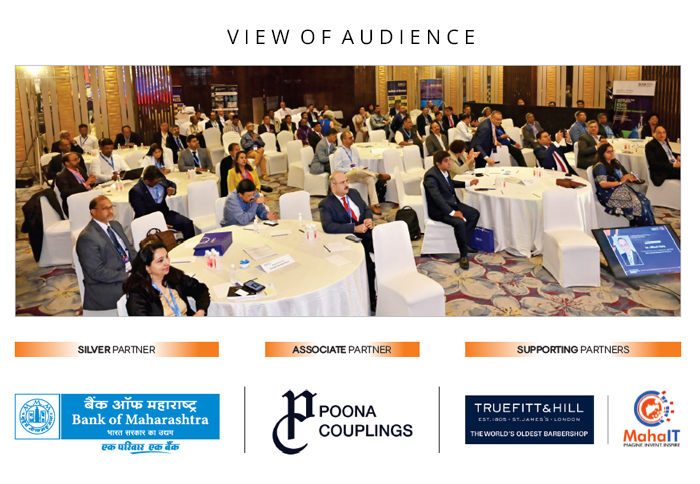

Bringing a Silent Revolution through the Boardroom
Institute of Directors (IOD) is an apex national association of Corporate Directors under the India's 'Societies Registration Act XXI of 1860'. Currently it is associated with over 30,000 senior executives from Govt, PSU and Private organizations of India and abroad.
Owned by: Institute of Directors, India
Disclaimer: The opinions expressed in the articles/ stories are the personal opinions of the author. IOD/ Editor is not responsible for the accuracy, completeness, suitability, or validity of any information in those articles. The information, facts or opinions expressed in the articles/ speeches do not reflect the views of IOD/ Editor and IOD/ Editor does not assume any responsibility or liability for the same.
About Publisher

Bringing a Silent Revolution through the Boardroom
Institute of Directors (IOD) is an apex national association of Corporate Directors under the India's 'Societies Registration Act XXI of 1860'. Currently it is associated with over 30,000 senior executives from Govt, PSU and Private organizations of India and abroad.
View All BlogsMasterclass for Directors
Categories